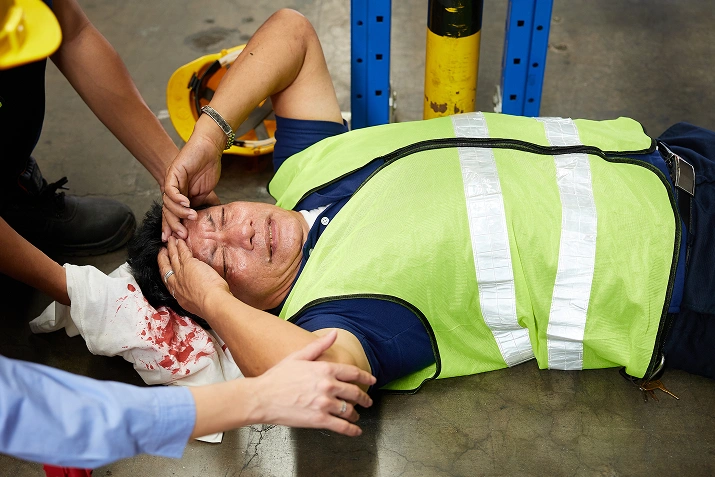Un abogado de lesiones personales catastróficas en Overland Park, KS, que presta servicios a toda la comunidad del área de Kansas City.

Las lesiones catastróficas son lesiones graves que pueden dejar a la víctima con una discapacidad permanente o la pérdida de funciones corporales.
Estas lesiones incluyen traumatismos craneoencefálicos, lesiones severas de la columna vertebral, quemaduras graves y daños a órganos internos. Según estadísticas recientes del Centro Nacional de Estadísticas de Lesiones de la Médula Espinal (NSCISC), hay aproximadamente 17,900 nuevos casos de lesiones de la médula espinal en los Estados Unidos cada año.
Si cree que las acciones negligentes de una parte fueron responsables de su lesión catastrófica, puede ser elegible para recuperar daños y perjuicios. Con más de 21 años de experiencia, el abogado de lesiones personales Mark Grover tiene la habilidad, diligencia y recursos para proteger los mejores intereses de las víctimas de lesiones catastróficas. Como abogado de lesiones personales capacitado, puede reconocer la compensación justa que cubra sus gastos médicos, ingresos perdidos, tratamientos médicos futuros y cualquier dolor, incomodidad y sufrimiento adicionales que haya tenido que soportar.
Si está listo para buscar justicia con un defensor excepcional a su lado, programe una consulta gratuita con un abogado de lesiones personales hoy. Servimos con orgullo a toda el área de Kansas City, incluyendo pero no limitado a ciudades como Overland Park, Independence, Shawnee, Liberty, Olathe, Lee’s Summit y más allá.
¿Qué son las Lesiones Catastróficas
Una lesión catastrófica es una lesión grave o daño al cerebro, columna vertebral, médula espinal, órganos internos u otras partes del cuerpo de una persona, que generalmente causa una discapacidad permanente, discapacidad a largo plazo o una incapacidad completa para funcionar. Si bien algunas lesiones catastróficas pueden requerir múltiples cirugías o un período de recuperación prolongado, las víctimas a menudo sufren consecuencias devastadoras y a largo plazo.
Ejemplos de Lesiones Catastróficas
A continuación, se presentan algunos ejemplos comunes de lesiones catastróficas:
- Lesiones en la cabeza y traumatismos craneoencefálicos
- Fracturas múltiples de huesos
- Daño a órganos internos
- Lesiones de la columna vertebral o médula espinal
- Fracturas de cráneo
- Lesiones de rodilla
- Lesiones de cuello y espalda
- Lesiones de cadera/fracturas de pelvis
- Lesiones internas
- Amputaciones
- Lesiones por quemaduras severas
- Trastornos neurológicos
- Desfiguración
- Pérdida de la vista, audición u otros sentidos
- Lesiones permanentes al sistema nervioso central
Un abogado experimentado en lesiones personales catastróficas puede evaluar la magnitud de las lesiones y determinar cómo proceder con las reclamaciones por lesiones personales.
Reclamaciones por Lesiones Personales en Kansas
Reclamos por Lesiones Personales en Kansas Kansas es un estado de seguro de auto “sin culpa”. “Sin culpa” significa que su póliza de seguro -conocida como cobertura de Protección contra Lesiones Personales (PIP)- pagará sus gastos médicos y otras pérdidas si sufre un accidente, sin importar quién tuvo la culpa.
Sin embargo, las víctimas pueden salir del sistema de seguro sin culpa y presentar una demanda contra la parte culpable si cumplen con el siguiente umbral:
- Superaron la cobertura PIP para sus gastos médicos.
- Sufrieron una “lesión grave”.
Según la ley de Kansas, una lesión grave es aquella que causa lo siguiente:
- Desfiguración permanente
- Lesión permanente
- Fractura de un hueso de soporte de peso
- Fractura comprimida, compuesta o desplazada de cualquier hueso
- Pérdida permanente de la función corporal
Fallo comparativo modificado
Falla Comparativa Modificada Kansas aplica la regla de “falla comparativa modificada” con un límite del 50%. Esto significa que una víctima puede recuperar daños si es parcialmente responsable (menos del 50%) de sus lesiones. Sin embargo, la compensación se reducirá según el porcentaje de culpa. Si es igualmente o mayormente responsable (50% o más), no podrá reclamar compensación.
Estatuto de limitaciones
Plazo de Prescripción En Kansas, el plazo de prescripción para presentar un reclamo por lesión catastrófica es de dos años desde la fecha del accidente (Estatutos de Kansas Sección 60-513).
Reclamaciones por lesiones personales en Missouri
Reclamos por Lesiones Personales en Missouri Missouri es un estado de seguro “con culpa”. Según sus leyes, la parte culpable es responsable de las lesiones, daños y pérdidas sufridas por la víctima. Para recuperar daños, puede:
- Presentar un reclamo a su proveedor de seguros
- Presentar un reclamo de terceros contra el seguro de la parte culpable
- Presentar una demanda civil contra la parte culpable
Falta comparativa pura en Missouri
Según la Sección 516.120(4) de los Estatutos Revisados de Missouri, una acción que busque una reparación por un daño a la persona o los derechos de otra persona debe presentarse dentro de los cinco años siguientes a la fecha en que ocurrió el accidente o la lesión. Por lo tanto, debe presentar una acción para recuperar
Estatuto de limitaciones
Under Missouri Revised Statutes Section 516.120(4), an action seeking relief for an injury to the person or rights of another person must be brought within five years from the date the accident or injury occurred. Therefore, you must file an action to recover
Demandas por muerte por negligencia
La muerte por negligencia puede describirse como una muerte evitable que ocurrió debido a actos negligentes, ilícitos, descuidados o intencionales de otra persona.
Reclamación por muerte por negligencia en Kansas
Según la ley de Kansas, la muerte por negligencia ocurre cuando “la muerte de una persona es causada por el acto u omisión ilícito de otra”.
¿Quién Puede Presentar una Demanda
En Kansas, los “herederos legales” del fallecido que hayan sufrido una pérdida debido a su muerte pueden presentar una demanda por muerte injusta. Esto incluye al cónyuge sobreviviente, hijos, padres, abuelos y hermanos. Una acción por muerte injusta debe presentarse dentro de los dos años siguientes a la fecha de fallecimiento del difunto.
Demanda por Muerte Injusta en Misuri
Según la ley de Misuri, una muerte injusta es aquella que ocurre debido a “cualquier acto, conducta, suceso, transacción o circunstancia” causada por otra persona.
¿Quién Puede Presentar una Demanda?
Bajo la ley de Misuri, las siguientes personas pueden presentar una demanda por muerte injusta:
- En primer lugar, el cónyuge sobreviviente, los padres, los hijos o los descendientes de los hijos del fallecido.
- Luego, los hermanos sobrevivientes del fallecido o sus descendientes.
- Finalmente, un “demandante ad litem” designado por el tribunal de Misuri para gestionar la reclamación.
La acción civil para reclamar daños por muerte injusta debe presentarse dentro de los tres años siguientes a la fecha del fallecimiento de la víctima.

¿Ha sufrido una lesión catastrófica debido a la negligencia de otra persona? En GroverLawKC, luchamos por la justicia y la compensación que merece. ¡No espere más para defender sus derechos! Llámenos hoy para una consulta gratuita.
Preguntas frecuentes
Muchos factores, como los tipos de casos, la experiencia del abogado y la estructura de honorarios, influyen en el costo de contratar a un abogado en Kansas City. Por lo general, usted paga a GroverLawKC $0 por adelantado en honorarios legales. Las tasas sólo se cobran si se ha recuperado la compensación.
Sí, si usted fue parcialmente culpable de un accidente, aun así, a menudo puede recuperar una compensación, pero en leyes como las reglas de “negligencia comparativa”, usted recibe su compensación en función de su porcentaje de culpa. El mejor abogado de lesiones personales de GroverLawKC puede ayudarlo en su caso y luchar por la compensación que se merece.
GroverLawKC y nuestros abogados de lesiones personales pueden presentar una demanda para recuperar las pérdidas por daños resultantes del accidente. El proceso para presentar un reclamo incluye buscar tratamiento médico, presentar un informe de accidente, reunir pruebas y presentar un reclamo ante la compañía de seguros y ante el tribunal.

